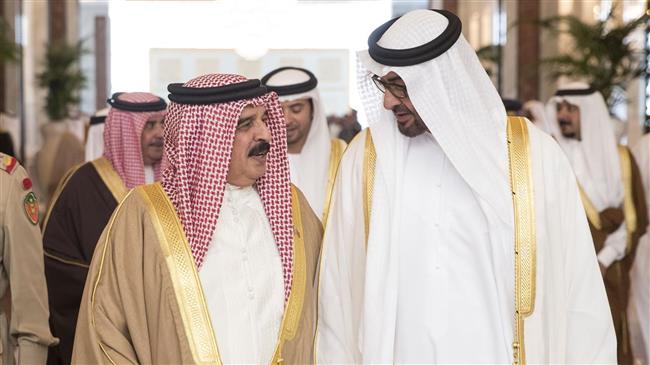
RNA - According to a report published by the London-based pan-Arab daily newspaper al-Quds al-Arabi, Bahrain’s 68-year-old monarch is mulling over dismissing his paternal uncle, who has been the country’s prime minister since 1970, and appointing his fourth son Sheikh Nasser bin Hamad Al Khalifah in his place.
Informed sources, requesting anonymity, said King Hamad would resort to changes in the mandate of the state Covenant as a more plausible scenario to fulfill his ambitions, otherwise, he and Al Nahyan have to concoct another scheme.
The same source further noted that the dismissal of the Bahraini prime minister will undoubtedly plunge the tiny Persian Gulf kingdom into great turmoil.
Political pundits see two reasons for the agreement between Hamad bin Isa Al Khalifa and Sheikh Mohammed bin Zayed bin Sultan Al Nahyan on favred changes in Bahrain’s political arena.
Firstly, the Bahraini ruler would remove a person, whose presence in the country’s political scene has long been haunting him, and created the notion that the real administration of the country is in the hands of the prime minister.
Secondly, the Crown Prince of Abu Dhabi would get rid of a strong man, who tends to resist the absolute dominance of the United Arab Emirates on Bahrain.
It is not yet clear whether Saudi Arabia, which considers Bahrain as its backyard, would come on board and support a change in Bahrain’s political leadership, or whether it would exercise utmost caution about such a move.
Thousands of anti-regime protesters have held demonstrations in Bahrain on an almost daily basis ever since a popular uprising began in the country in mid-February 2011.
They are demanding that the Al Khalifah dynasty relinquish power and allow a just system representing all Bahrainis to be established.
According to Press TV, Manama has gone to great lengths to clamp down on any sign of dissent. On March 14, 2011, troops from Saudi Arabia and the United Arab Emirates were deployed to assist Bahrain in its crackdown.
Scores of people have lost their lives and hundreds of others sustained injuries or got arrested as a result of the Al Khalifah regime’s crackdown.
On March 5, 2017, Bahrain’s parliament approved the trial of civilians at military tribunals in a measure blasted by human rights campaigners as being tantamount to imposition of an undeclared martial law countrywide.
The Bahraini monarch ratified the constitutional amendment on April 3 last year.
847/940